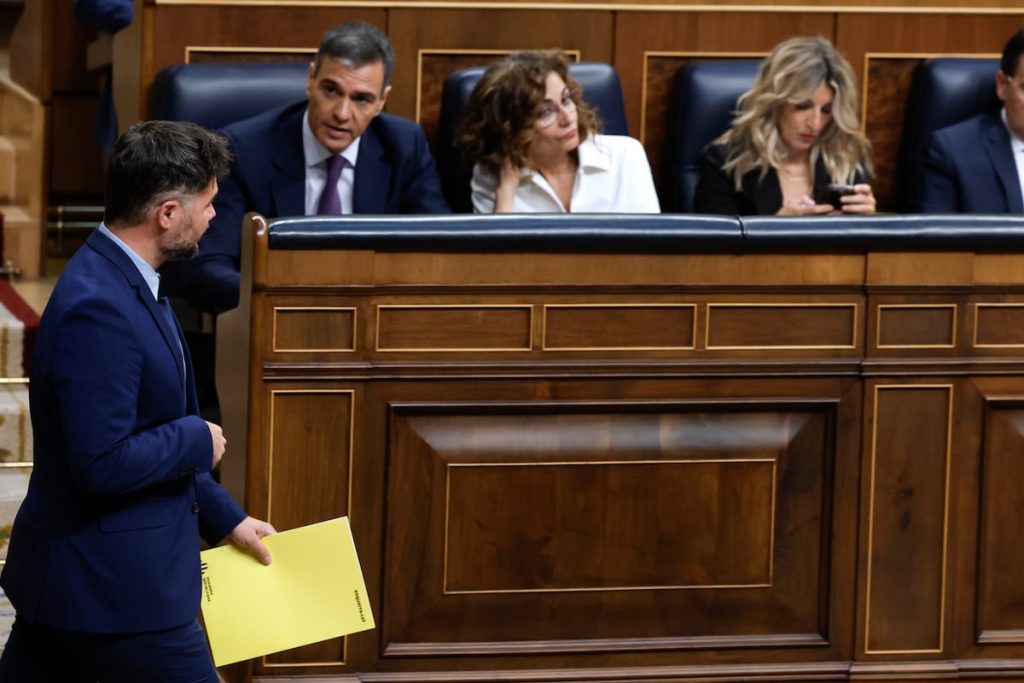With different nuances and interests, Pedro Sánchez’s partners made it clear on Wednesday in Congress: it is time to govern. In three weeks, the amnesty law will be approved and the European elections will close the exhausting cycle of four elections since the beginning of the year, which has kept the legislature partially frozen. Both the government’s minority partner and its parliamentary base are eager for measures to be implemented. Sánchez promised to get to work after the European elections on June 9, starting with the previously vague program of “democratic regeneration.” Any doubts about the apparent weakness of the socialist leader when he hinted at resignation three weeks ago were dispelled during a long parliamentary appearance on Wednesday. Over six hours of debate, the energetic Sánchez reappeared, defiant in the face of criticism, including those of his wife’s private activities. The president called for an end to polarization, accusing the PP of becoming increasingly far-right. This idea served as the thread of the debate, signaling the Socialist Party’s main message for June 9: warning of the rise of the far-right across Europe and the supposed complicity of traditional right-wing parties, with the added note that “hate speeches” feed into “political violence.”
The electoral message in Sánchez’s speech became explicit when it was Alberto Núñez Feijóo’s turn to speak. The leader of the PP ended his two interventions by calling on Spaniards to punish the government at the polls and participate in a new demonstration next Sunday in Madrid. While Sánchez discussed Palestine and Ukraine, Feijóo seemed more interested in the president’s wife, Begoña Gómez. Particularly in his response, accompanied by enthusiastic support from the Popular Party members, who erupted in thunderous applause every half-minute. The opposition leader did take some time to blame the government for the diplomatic crisis with Argentina and accused it of applying a double standard. While Vox leader Santiago Abascal defended his party colleague and friend Javier Milei, president of Argentina, against attacks by Sánchez and his wife, accusing the government of “pressuring and possibly bribing” the large business leaders who later repudiated Milei after his insults to the Spanish president.
The impatience of Sánchez’s partners was evident during the rest of the interventions, with calls for the new legislature to be activated. Left-leaning parties demanded immediate social measures in areas such as employment and housing. All parties criticized the president for failing to specify the much-hyped “democratic regeneration.” Sumar’s government partners, as well as ERC, EH Bildu, and Podemos, urged Sánchez to seek alternatives to renew the General Council of the Judiciary and bypass the PP’s obstruction. Sánchez admitted that he is beginning to conclude that the populares will not negotiate this time either and promised to open talks with parliamentary groups after the European elections to discuss this and other measures.
Iñigo Errejón, from Sumar, urged to “regain the initiative” with an ambitious political agenda. He pointed out the “brutal power asymmetry” in Spain due to the societal and institutional levers controlled by the right, putting the left in a “perpetual defensive attitude” when in power. Gabriel Rufián, from ERC, admitted that Errejón had preempted his speech, noting the depressive state of his party. Aitor Esteban, from the PNV, and Néstor Rego, from the BNG, reiterated their commitments to the Basque Country and Galicia. Esteban guaranteed his party’s willingness to ensure the legislature, highlighting the need for proposals and measures given the slim majorities. Overall, the partners of Pedro Sánchez expressed impatience and called for concrete action to move the legislative agenda forward.















